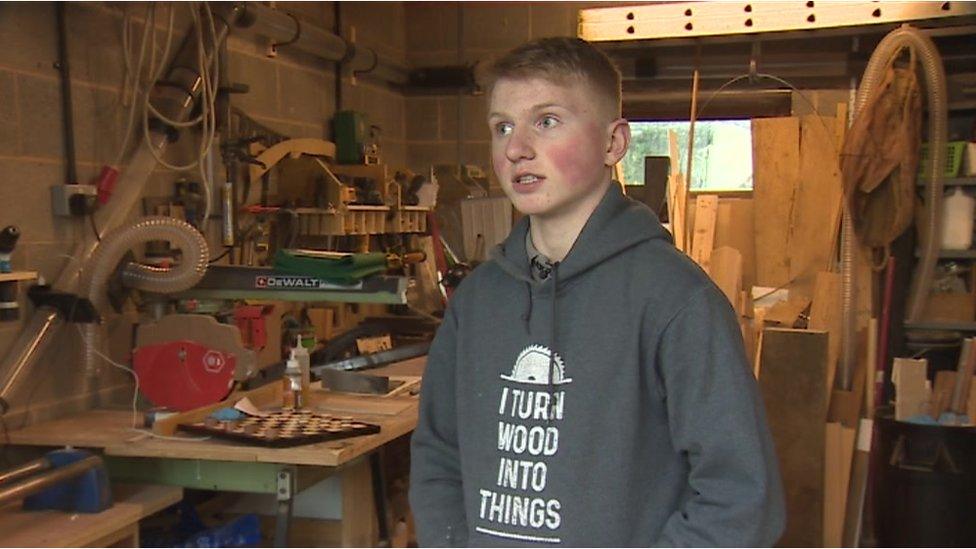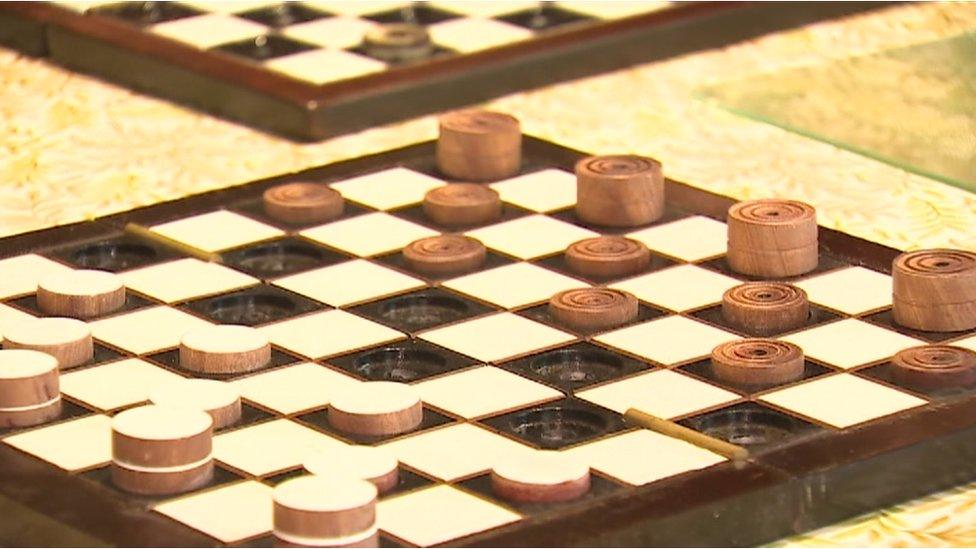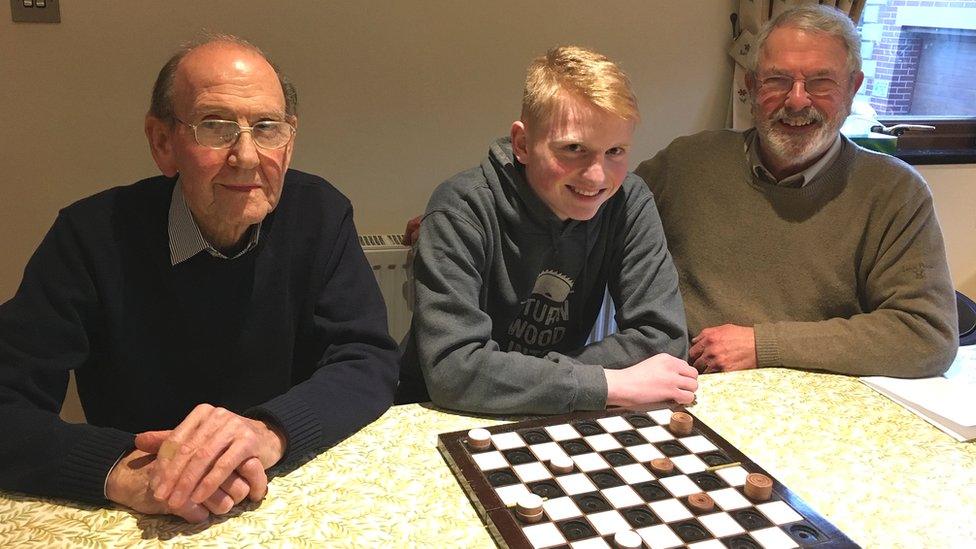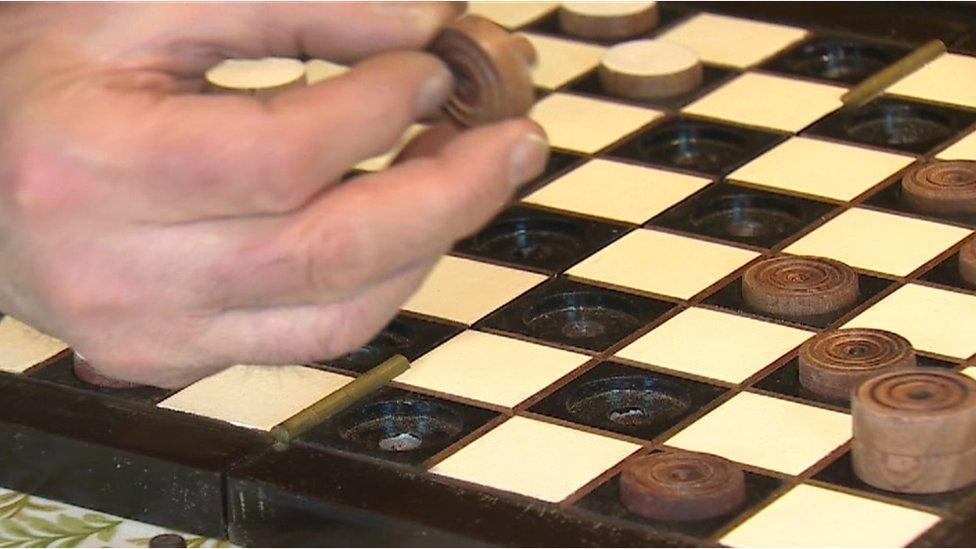Flintshire boy, 14, restores 1920 draughts board
- Published
100-year-old draughts board restored to its former glory
A 14-year-old boy has helped to restore a draughts board dating back 100 years and once used by a child prodigy.
Born in Quarry Road, Graigwen, Broughton, in 1878, Llewelyn Williams was a virtuoso deaf-blind pianist who began composing his own music aged 14.
He also became a draughts champion, playing on a specially adapted board made by his uncle in 1920.
Now, 100 years on with the draughts set badly in need of restoration, Flintshire wood-turner Chris Roberts stepped up to the challenge.
The Ysgol Bryn Alyn pupil has been a keen wood turner since the age of 10.
Although the Roberts' family business is now funeral directing, he comes from a long line of master craftsmen.

Chris Roberts works on his wood creations in his father's workshop

The original board dates from 1920
His great-grandfather Hugh Owen Roberts was an expert carpenter, as was his grandfather Stuart, and Chris is carrying on the tradition.
"For as long as I can remember whenever my dad was in the workshop I loved wandering in and trying to make something of my own, pens are now my favourite," Chris said.
"I work mostly by eye rather than measurement and there's a real thrill in knowing just how far to turn them so that they're delicate but not weak.
"I heard about Llewelyn's draughts set after Godfrey, his great nephew, asked my father at a funeral if he knew of anyone who could reproduce the pieces."
Another carpenter, Emyr Jones, restored the original board and made an exact replica, but most of the draughts were lost over time.

Emyr Jones (left) restored the board while Chris (centre) worked on the draughts for Godfrey Williams (right), Llewelyn Williams' great-nephew
"The pieces have pegs in the bottom which slot into holes in the board. The whites are smooth, but the blacks have indentations in the top so Llewelyn could tell the colours apart.
"Unfortunately none of the double kings remained, but that's OK, it just allowed me to get a bit creative with the design," he said.
"Hopefully what I've come up with is faithful to the original, but with my own twist."
In 1890, aged 12, Llewelyn contracted measles, losing his sight immediately and gradually thereafter his hearing too.
In 1892 the proceeds of a benefit concert in Brake Chapel, Moss, enabled the young musician to attend the Liverpool school for the blind.
There he studied under director of music Edward Watson, who described Llewelyn as "a brilliant young pupil of mine".
"He was a most promising youth and never took more than a month to learn, and to play, the whole of a Beethoven sonata.
"This was when Braille was not up to its present advanced state. Now I would suppose he would do it in half that time."
After leaving the Liverpool school, Llewelyn's encroaching hearing-loss forced him to switch his attention from concert pianist to composer.
His pianoforte composition Zingaresca was highly commended by Fellow of the Royal Academy of music Ernest Fowles, who was widely acknowledged as one of the most eminent music teachers of his time.
Away from music, he played draughts in the North Wales Championship, with a Mr Charles from Rhos, who wrote a column in the News of the World on the game.

The pieces have pegs to keep them in place and the black pieces have markings to identify them
And it is draughts as much as music for which great-nephew Godfrey Williams recalls Llewelyn, who moved into Godfrey's family home in 1945, just three years before his death.
"I was only a toddler when Llewelyn moved in with us so I don't have any personal memories, but the stories I've heard!" he said.
"Llewelyn seems to have had something of a photographic memory. He'd play draughts with the members in the institute hall opposite our home and when he went to the loo the others would think it fun to rearrange the pieces.
"You know Llewelyn could recall where every draught had been and put them back exactly right with a smile.
"Similarly the men would read the football results into his ear trumpet on a Saturday afternoon, and when they came to mark their pools coupon the following Friday, Llewelyn could recall each score perfectly, in alphabetical order.
"I suppose that's what allowed him to be such a great musician."
In 1926 the Liverpool Weekly Despatch published an article "Blind and deaf composer - handicap fails to stop him from working."
A similar article appeared on the front page of North Wales' Daily Sketch around the same time, and both reports paid tribute to his wonderful memory.
Chris says Llewelyn's story has left a lasting impression.
"Hearing about how determined he was to succeed against the odds, it makes you realise how lucky you are to be given a gift like he had, and like I have for wood turning," he said.
"I doubt I'll make a profession of it, as I think my parents already have me earmarked to take over the family funeral business, but I'll definitely be keeping it up as a hobby. As Llewelyn showed, talents like that are too precious to waste."
- Published5 March 2012
- Published5 April 2019

- Published21 July 2019

- Published14 December 2019

- Published30 August 2019

- Published5 December 2019

- Published28 September 2019
